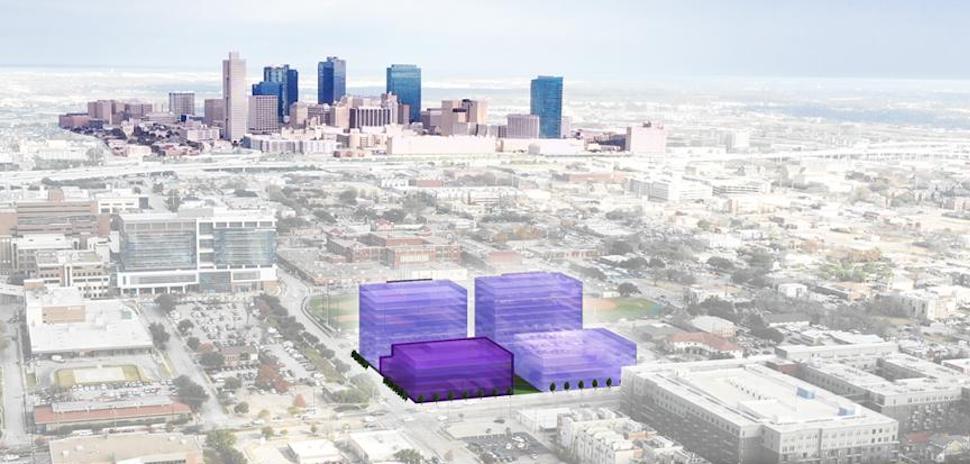Texas Christian University’s School of Medicine says its aim is to drive innovation and outcomes in the community. And soon it will be doing that from a new home.
The university has announced plans to build its new medical campus in Fort Worth’s Near Southside neighborhood, planting its flag in the city’s medical district near players like the Baylor Scott & White All Saints Medical Center and Texas Health Harris Methodist hospital—both of which share graduate medical education collaborations with TCU.
“The TCU School of Medicine campus is an investment in the long-term health of our community, training and educating future physicians, many of whom will remain in the area expanding our physician workforce and fulfilling an important need for our city and state,” Fort Worth Mayor Mattie Parker said in a statement. “This expansion…represents a significant contribution to the Fort Worth economy and job growth.”
Building a biotech hub
The project will kick off with a four-story, approximately 100,000-square-foot medical education building, which TCU says will serve as an “academic hub” for around 240 students and hundreds of faculty and staff members, after its planned completion in 2024. Renderings of the new campus (seen above) also show room for three additional buildings at the site, which the Fort Worth Star-Telegram reports could include facilities like student housing.
TCU said the move will allow it to expand its educational offerings to students—focusing largely on the biotech industry—through partnerships with hospitals, health care organizations, and other companies in the field. In addition to major healthcare providers in the region, Fort Worth is home to a number of other biotech-focused organizations, including venture capital firm Bios Partners and companies from startups to big names like Galderma and Eosera.
“This new medical campus is ideally located, sitting in the heart of the medical district and adjacent to our valued clinical partners and medical providers,” said Dr. Stuart Flynn, founding dean of the medical school, in the statement. “Proximity of the medical school is essential to build robust relationships and advantage the amazing opportunities that we and our partners have in Fort Worth.”
Innovative curriculum stresses AI, genomics, and other tech
The medical school’s innovative curriculum focuses on developing Empathetic Scholars and future physicians “who are able to walk in a patient’s shoes.” The approach features “flipped classrooms” without lectures and partnering students with physicians from their first day in medical school.
TCU says this allows students more time to study major drivers of medicine’s future, including artificial intelligence, genomics, and technology used in monitoring patient health and disease. Students are also tasked with completing a four-year Scholarly, Pursuit & Thesis research project on a topic of their own choice, to promote life-long inquiry and learning.
TCU takes the helm
TCU’s School of Medicine was initially formed in 2015 via a partnership with the University of North Texas Health Science Center, where it has previously housed its facilities. The first class of students began in July 2019 and will graduate in 2023.
The TCU-HSC partnership ended at the beginning of this year, after TCU announced it would take over as the sole degree-granting university for the medical school. According to the two universities’ separation agreement, the TCU Medical School will continue to lease and use space at the HSC’s Interdisciplinary and Research Building, with the lease ending August 31.
“This is an exciting time for our institution,” said Teresa Abi-Nader Dahlberg, provost and vice chancellor for academic affairs at TCU, in the statement. “Our work and research in developing new therapies, addressing health disparities, and healing through clinical and social interventions has created positive impact for decades. The TCU School of Medicine advances our mission, and this new campus promises to strengthen our community even more.”
![]()
Get on the list.
Dallas Innovates, every day.
Sign up to keep your eye on what’s new and next in Dallas-Fort Worth, every day.














![The Techstar team briefed the Fort Worth City Council on the new accelerator program Tuesday. [Courtesy photo]](https://s24806.pcdn.co/wp-content/uploads/2022/02/Techstars_announcement-970x464.jpg)



















































